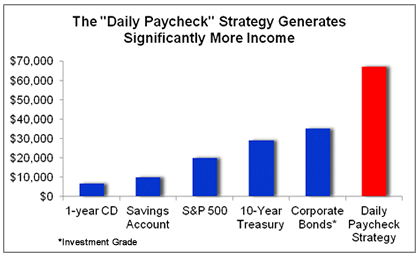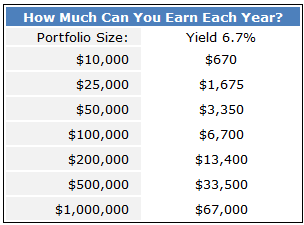| RETIRE RICH Investing well isn't about flashy and confusing charts or subscribing to pricey and highly ineffective advisory newsletters. It's about using a common-sense approach to allocating your money into the safest blue-chip performers in the market. I can't stress it enough... wealth is created over time and dividends are the less volatile means of achieving it. |
By Amy Calistri
Most people don't have a million dollars to invest. It doesn't matter. What I'm going to show you applies no matter how much money you have to invest -- whether it's $100 or $100 million. But there is a sad truth about a million dollars. Even that heady amount wouldn't earn you much in regular income -- if you put it to work in the "traditional" ways.
$560. That's the most you will get each month if you put that $1 million into a 1-year CD, which, according to BankRate.com, is yielding just 0.67%. For comparison, the average Social Security check is $1,266 per month. In other words, you'd earn more from Social Security than you would from $1 million.
Most people don't have a million dollars to invest. It doesn't matter. What I'm going to show you applies no matter how much money you have to invest -- whether it's $100 or $100 million. But there is a sad truth about a million dollars. Even that heady amount wouldn't earn you much in regular income -- if you put it to work in the "traditional" ways.
$560. That's the most you will get each month if you put that $1 million into a 1-year CD, which, according to BankRate.com, is yielding just 0.67%. For comparison, the average Social Security check is $1,266 per month. In other words, you'd earn more from Social Security than you would from $1 million.
It's a similar story with a number of other investments.
10-year Treasury Note -- Sitting near historically low levels, if you loaned the federal government $1 million, with annual yields at 2.9%, you'd only earn $29,000 a year... or $2,900 a year on $100,000.
Savings Accounts -- With a maximum yield of 1%, the absolute best you'll get from a savings account according to BankRate.com right now is $10,000 a year.
Corporate Bonds -- If you invest in the right investment-grade corporate bonds, you could net roughly 3.5% a year on $1 million -- generating $35,000 a year in income. Not a bad amount of money to bring in each year, if it didn't require a million-dollar investment. A portfolio of $100,000 would earn just $3,500 per year.
S&P 500 -- You could also simply buy an index fund with your million dollars. With an average dividend yield of about 2%, you'd earn about $20,000 a year if you invested alongside the S&P 500.
The sad truth is that even with a million dollars, your options for income with "traditional" investments aren't very comforting. But there is some good news.
As of now, I'm earning $16,750 a year (or almost $1,400 a month) on a portfolio of securities currently worth $250,000 using my "Daily Paycheck" strategy. If my portfolio were worth $1 million -- four times as much -- I'd be earning $67,000 per year. That's considerably more than you can earn from Treasuries or CDs or the broader market.
10-year Treasury Note -- Sitting near historically low levels, if you loaned the federal government $1 million, with annual yields at 2.9%, you'd only earn $29,000 a year... or $2,900 a year on $100,000.
Savings Accounts -- With a maximum yield of 1%, the absolute best you'll get from a savings account according to BankRate.com right now is $10,000 a year.
Corporate Bonds -- If you invest in the right investment-grade corporate bonds, you could net roughly 3.5% a year on $1 million -- generating $35,000 a year in income. Not a bad amount of money to bring in each year, if it didn't require a million-dollar investment. A portfolio of $100,000 would earn just $3,500 per year.
S&P 500 -- You could also simply buy an index fund with your million dollars. With an average dividend yield of about 2%, you'd earn about $20,000 a year if you invested alongside the S&P 500.
The sad truth is that even with a million dollars, your options for income with "traditional" investments aren't very comforting. But there is some good news.
As of now, I'm earning $16,750 a year (or almost $1,400 a month) on a portfolio of securities currently worth $250,000 using my "Daily Paycheck" strategy. If my portfolio were worth $1 million -- four times as much -- I'd be earning $67,000 per year. That's considerably more than you can earn from Treasuries or CDs or the broader market.
Of course, there's a big difference between a portfolio of dividend payers and simply putting your money in a CD, Treasury or even a broad index fund that tracks the S&P. I'll be the first to tell you that it's hard to match the safety of a U.S. Treasury bond if you hold it to maturity. But you might be surprised how stable a "Daily Paycheck" portfolio can be.
Let me give you one example...
You may remember the market sell-off that occurred back in August 2011. All the headlines were dour... investors around the world were anxious about a potential default by Greece, high oil prices, budget problems in the United States and elsewhere and soaring unemployment. The S&P 500 lost 5.7% in the month of August alone; a major move for one of the world's most recognized indices.
My portfolio? Despite all the turmoil, my account fell just 1.0% during the month. That's roughly one-sixth the amount the broader market fell.
That's not to say my portfolio will always hold up as well, but I do like my odds. After all, the last time I checked, the S&P wasn't throwing off thousands of dollars in income each month, helping to smooth out returns no matter which way the market moves.
Let me give you one example...
You may remember the market sell-off that occurred back in August 2011. All the headlines were dour... investors around the world were anxious about a potential default by Greece, high oil prices, budget problems in the United States and elsewhere and soaring unemployment. The S&P 500 lost 5.7% in the month of August alone; a major move for one of the world's most recognized indices.
My portfolio? Despite all the turmoil, my account fell just 1.0% during the month. That's roughly one-sixth the amount the broader market fell.
That's not to say my portfolio will always hold up as well, but I do like my odds. After all, the last time I checked, the S&P wasn't throwing off thousands of dollars in income each month, helping to smooth out returns no matter which way the market moves.



 RSS Feed
RSS Feed
